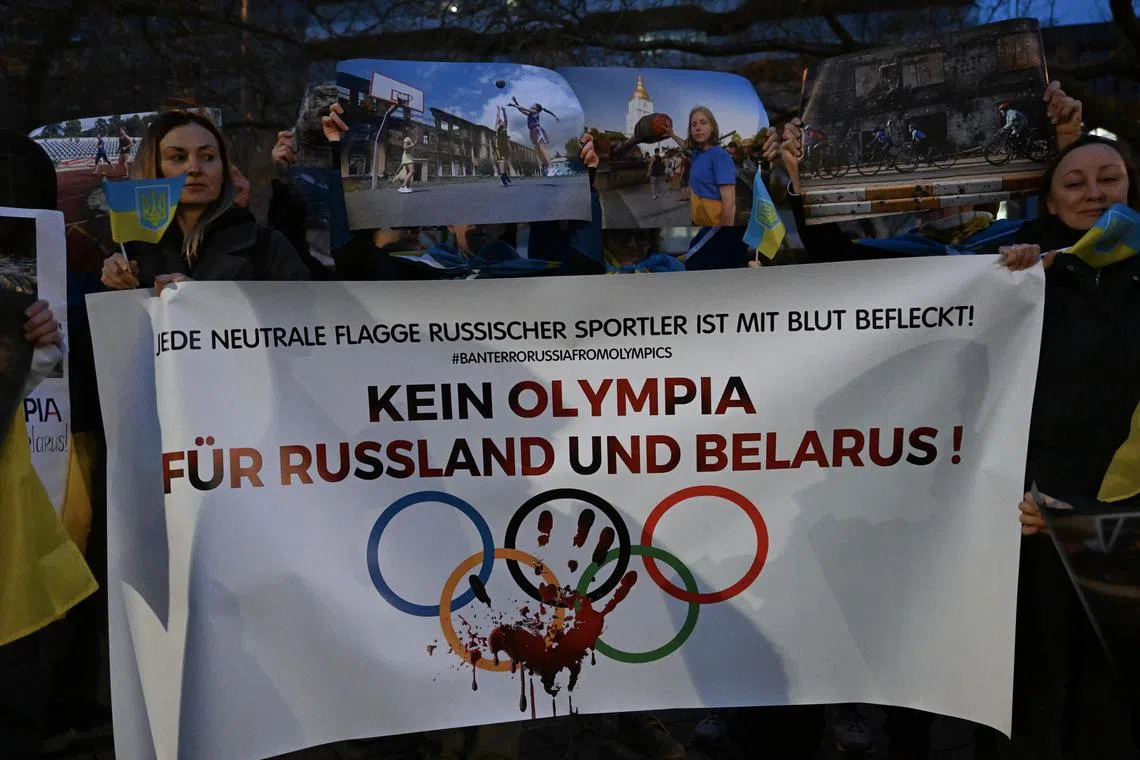IOC rules on participation ‘unacceptable’, says Russian Olympic head
Sign up now: Get the biggest sports news in your inbox

Ukrainian refugees protest in Germany against any participation of Russian and Belarusian athletes at the Paris 2024 Olympic Games.
PHOTO: REUTERS
LAUSANNE – The head of Russia’s Olympic Committee has denounced the criteria set by the International Olympic Committee (IOC) to enable Russian and Belarusian athletes to take part in international competitions as “unacceptable”.
Athletes from Russia and its ally Belarus are banned from competition following the invasion of Ukraine in February 2022, but the rules announced at the IOC’s Lausanne headquarters on Tuesday seek to allow a gradual return to world sport.
However, Stanislav Pozdnyakov, president of the Russian Olympic Committee, said that he opposed any notion that athletes from the two nations compete as neutrals without using their flags or anthems.
He also denounced the imposition of additional anti-doping procedures for Russian competitors – a measure linked to previous doping scandals.
“The parameters as announced are absolutely unacceptable. This is discrimination on the basis of nationality, as repeatedly noted by international human rights specialists,” he said.
“Neutral status is a violation of human rights... We believe the proposed conditions to be groundless, void of legal basis and excessive.
“We (also) categorically disagree with conducting additional anti-doping procedures with regard to Russian athletes.”
The IOC decision, he added, amounted to “an acknowledgment of its error” when the ban on Russian and Belarusian athletes was introduced days after Russian troops moved into Ukraine.
The IOC, now keen to allow Russian and Belarusian athletes back across all sports, has set out a pathway for these competitors to earn Olympic slots through Asian qualifying.
Ukraine has spearheaded a campaign to boycott the 2024 Paris Olympics should those athletes compete, even as neutrals.
The criteria announced on Tuesday concern the return of those athletes to international competitions but not the Paris Games, for which a separate decision will be taken later.
However, the recommendations still triggered angry reactions from countries opposed to Russian and Belarusian participation.
IOC president Thomas Bach said after the meeting: “Sports organisations must have the sole responsibility to decide which athletes can take part in international competitions based on their sporting merits and not on political grounds or because of their passports.”
But he added that athletes who support the war or are contracted to their countries’ military or national security agency are excluded from this proposal.
Poland, a neighbour of Ukraine, reacted angrily to the IOC’s recommendations.
“What happened that was so positive from the Russian side that their athletes should take part in competitions!!” Polish Deputy Foreign Minister Piotr Wawrzyk tweeted.
“After daily bombing of civilian targets!! It’s a day of shame for the IOC!!”
Czech Foreign Minister Jan Lipavsky said Russia had no place in the Olympics.
“I am disappointed by the IOC recommendations,” he wrote on Twitter.
“We must not close our eyes to reality. Russian sport is centrally managed by the Kremlin. The Russian regime does not know what fair play is.
“Its athletes do not belong in the Olympic Games. We will continue to deal with this issue, including with the expert group (Czech Olympic Committee).”
Bach had earlier told the IOC executive board that Russian and Belarusian athletes were already competing daily in many sports without facing problems.
“Participation of athletes with Russian and Belarusian passports in international competitions works,” he said.
“We see this almost every day in a number of sports, most prominently in tennis but also in cycling, in some table tennis competitions.
“In none of these competition security incidents have been happening.”
World Athletics, the biggest Olympic crowd-puller, last week decided to keep Russians and Belarusians banned from all of their events for the foreseeable future.
A dozen countries boycotted the women’s world boxing championships in India earlier in March in protest at the presence of Russians and Belarusians.
More than 300 fencers wrote to Bach


